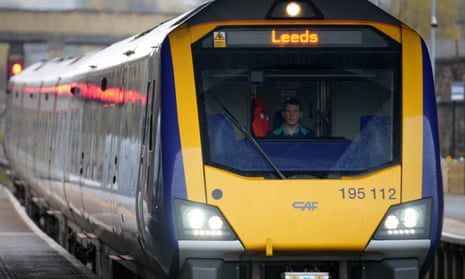Leeds council, along with authorities across the north and Midlands, has spent 10 years planning for the arrival of HS2’s eastern leg based on the government’s proposal. High-speed rail would have brought the millions of people between Leeds and Birmingham closer; provided new opportunities for commuting; and created much-needed capacity on the existing network so that local, express and freight trains would no longer compete for space on two-track Victorian infrastructure.
All this would have supported 160,000 new jobs, stimulated a gross value added uplift to the economy of £200bn, and provided the opportunity to develop as many as 38,000 new homes. In fact, the plans had already started to draw businesses to Leeds. We are the proud home to major businesses and institutions such as Channel 4, the Bank of England, and the UK Infrastructure Bank. We at Leeds council had made great efforts to accommodate HS2’s arrival so the city could continue to grow. These plans became even more valuable to our city’s future as we began the recovery from the pandemic, and to tackle the climate emergency.
Despite this, and despite research that shows the eastern leg provides a better economic return than any other stretch of HS2, much of the route has been shelved. Recent months saw a steady buildup of rumours in the press to this effect – and the first confirmation we received was in the media on Thursday morning.
In its place we’ve been offered yet another study to determine how to bring high-speed rail to Leeds that would connect us with Sheffield, the wider north and the Midlands, and for our region only, small-scale improvements to existing networks. This simply isn’t enough to match what was previously on the table.
After 10 years of investment and planning based on the government’s clear proposal to bring HS2 to Leeds, we have been left extremely disappointed and frustrated. But sadly we are not surprised, because this is not the first time Leeds has had a major transport project cancelled or curtailed by a government. Even Thursday’s announcement of the electrification of the TransPennine route is only a rehashed version of a scheme that was promised in 2011 but has so far remained undelivered. And with only a quarter of West Yorkshire’s railways electrified so far, against a deadline of 2050 for the full network to be completed, it’s difficult to be optimistic that this will be achieved. Plans for a Supertram were also originally scrapped by the government in 2005, with proposals for a trolleybus also cancelled in 2016.
Reports say that the scrapping of the extension was about reducing costs, but Leeds is one of only two core cities outside of London that are net contributors to the Treasury. To grow further, the city needs investment to support current and future demand for travel. Three quarters of people using our railway station are travelling from outside our district – so clearly there is a demand for enhanced regional connectivity. Passenger levels at Leeds railway station are now above pre-pandemic levels, bucking national trends.
In Leeds we are not shy about our ambitions – we want to be the best city in the UK. Decisions like this to cancel infrastructure are bitterly disappointing, but we will continue to fight for the city as we always have. Now the pressure is on the government to deliver. We are calling for the Leeds to Sheffield work to be fast-tracked and delivered without delay, alongside an urgent review of safeguarded land across the city that will bring greater certainty, and a fundamental reform of the way transport policy decisions are being made. If the people drafting national policy actually used our station and knew the city, they would make better decisions. We remain determined to make sure that this is the last time a major project benefiting Leeds is cancelled.
James Lewis is leader of Leeds city council
